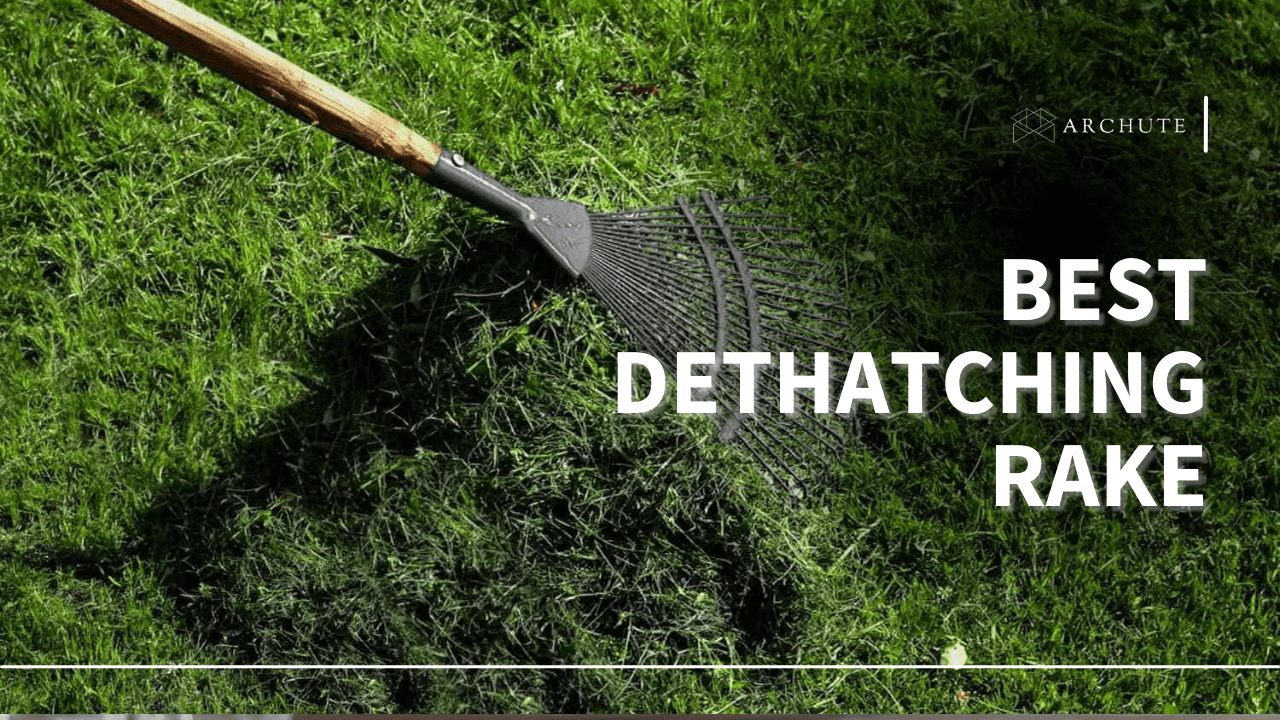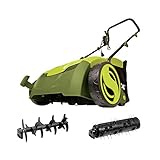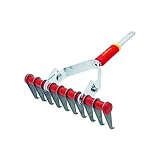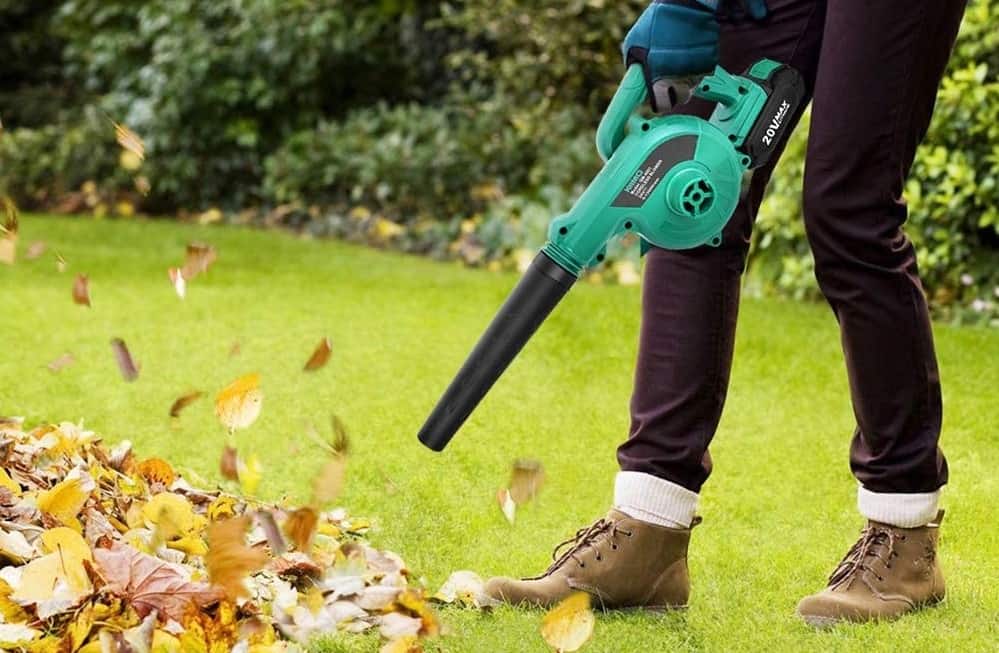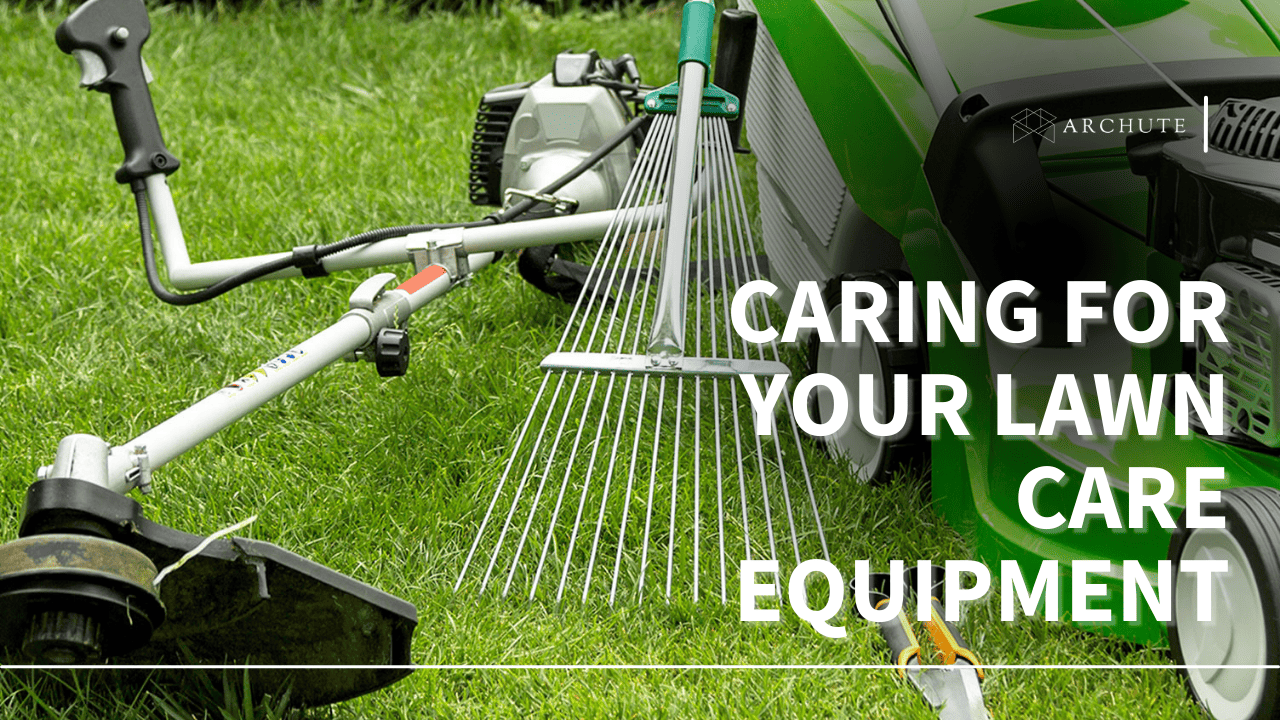One of the most attractive areas of a home includes the lawn. After cutting the grass short, the thatch and organic litter that remains can be hard to collect for disposal. That is why you need the best dethatching rake in your garage for a quick cleanup.
Picking the right model out of hundreds of options could take you forever. As such, this post covers a list of the top dethatcher options and the things to keep in mind as you do so.
We made the Sun Joe Electric Lawn Dethatcher our first pick in the list due to its scarifier function that makes cutting grass from the roots possible, and with its 12 amp motor, this dethatcher is strong enough to loosen up even the most stubborn entangled grass. Our second best option is the Agri-Fab Dethatching Rake, which only came second because of its lack of scarifier function. However, it comes with rust-proof tines for durability and also has a transport handle that makes it easy to raise and lower the tines easily and smoothly.
The third grass dethatcher rake we selected is the Wolf-Garten interlocking dethatching rake which comes with an adjustable head angle. It is also very affordable and that is why we made it our budget pick.
Let's get started!
What is Dethatching?
Dethatching is the process of removing thatch layer from your lawn. The thatch layer is usually a spongy brown carpet-like layer. Thatch is composed of dead grass, a layer of debris, and other organic matter. Dethatching helps your grass get its green color back.
Best Dethatching Rake
Rank | Product Image | Brand Name | Link |
|---|---|---|---|
1 | |||
2 | |||
3 | |||
4 | |||
5 | |||
6 | |||
7 |
1. Sun Joe Electric Lawn Dethatcher
- [POWERFUL]: 12-amp motor rakes a 13" wide path to get your job...
- [ADJUSTABLE DECK]: Tailor raking depth with 5-position depth...
- [SCARIFIED]: Use the Scarified function to cut grass roots for...
- [AIR BOOST TECHNOLOGY]: Spring steel tines for maximum thatch...
- [INCLUDED]: Detachable thatch collection bag for easy disposal

The Sun Joe Electric Dethatcher is one of the best dethatchers on the market. It is an ideal choice if you want to develop a lawn care routine for a small or mid-sized yard. It features a minimum cutting height, ensuring your grass is short enough to look tidy from a distance.

image credits: stephane, amazon.com
It creates a 12.6-inch wide work path which may not work very fast for those with large lawns, but its features make it worth it. It also was enough for my small backyard. The Sun Joe dethatcher is better than most lawnmowers because of the Scarifier function, which enabled me to cut the grassroots. This, in turn, caused thicker growth and a healthy-looking lawn, thanks to the performance of the 12 amp motor.
Pros:
Cons:
2. Agri-Fab 40-Inch Tine Tow Dethatcher
- Tine de-thatcher uproots dead, matted grass and dislodges...
- Twenty Durable spring tines for easy thatch removal; Penetrates...
- Rust-proof and replaceable spring-loaded tines are heat-treated...
- Transport handle for easy raising and lowering of the tines
- Made in USA
This is one of the best tools for uprooting dead grass and dislodging dirt in preparation for planting. The twenty spring tines distributed across the 40-inch wide swathe provided me with a great dethatching experience.
This Agri-Fab dethatching rake is strong enough and was able to penetrate and overturn weeds, dry grass, and even soil without much effort.

Image credits: lawnstarter.com
Another reason it is among the best lawn dethatching rakes is the rust-proof tines that have been heat-treated for enhanced durability. I used mine till the tines started showing signs of tear, and guess what? Replacing them is very easy. This feature ensures the rake lasts for years without needing a replacement.
This Agri-Lab de-thatching rake comes with a transport handle that can raise and lower the tines without hassle. As such, it is a versatile product that served me well by ensuring I could use it to do multiple tasks. For example, uprooting matted grass, dislodging impermeable dirt, and turning up weeds.
The semi-pneumatic wheels on this model have a diameter of 27 inches. This wide diameter is essential in traversing any landscape or garden. It came with a three-year limited warranty, which ensured I used it with confidence.
Pros:
Cons:
3. Wolf Garten Interlocken Dethatching Rake Head
- Part of the Multi-Change Range
- Efficient Moss Clearing
- 30cm Width
- Swing Head
- 10 Year Guarantee
The Wolf-Garten Interlocken thatching rake head is a hand-operated rake that is great for removing moss, dead grass clippings, and other debris from your yard. The head is 30 cm wide to provide a decent work width for clearing out a small lawn.

Image credits: breud, amazon.com
The 10 spring steel dethatching blades are fixed on the blade bar, which is on a pendulum. As such, you can adjust the head angle to find the best tilt for using this tool. Unfortunately, this dethatching rake is sold only as a head, and the handles come at an additional cost.
Pros:
Cons:
4. Brinly Tow-Behind Dethatcher
- Maximum Thatch Removal: For larger mowers and lawns, a 48"...
- Ideal for Large Yards: Wide 48" working width is perfect for...
- Long-Lasting Construction: All steel construction, tines are made...
- Transport Wheels: 8" never-flat transport wheels are located...
- Spring Steel Tines: 24 long-lasting, triple-coil strength 3/16″...
The Brinly Tow-Behind Dethatcher is one of my favorite dethatchers. I enjoyed using it as it is suitable for people with large lawns, and mine is quite large. Brinly tow-behind dethatcher has two rows of a dozen steel tines designed to remove thatch and comb through your lawn effectively.
Imagine working with a dethatcher that has a width of 48 inches; interesting because you won't spend too much time dethatching. If you have a large green space, this is the tool you need to cover more ground within a shorter time.

Image credits: brinly.com
The all-steel construction of this lawn dethatcher makes it a durable option that can endure years of use without breaking down. Even if one of the tines breaks off, which is unlikely, the safety rod in this product will catch it to prevent it from making contact with the blades of your lawnmower.
I also realized that this dethatcher has a universal hitch pin. I used it with my tractor. However, you can still use it if you have a ZTR or ATV. This makes it very useful as it does not rely on one hitch pin.
I also enjoyed assembling this tool as it comes with a pictorial manual. Who wouldn't know what to do with such clear instructions?
Pros:
Cons:
5. Greenworks Cordless Dethatcher
- Powerful 40V motor provides up to 30 minutes run-time with 4Ah...
- Charger provides full recharge in 120 minutes putting you back to...
- 14-Inch dethatching path gets your work done faster
- Stainless steel tines stay sharp longer for reliable performance
- Maintenance free - No gas, oil, or tune-ups
If you're like me and prefer a dethatcher that will do all the heavy lifting, the Greenworks Cordless Dethatcher is what you are looking for. It comes with a strong 40V motor that runs the machine for about 30 minutes on a full charge. This was enough time for me to finish dethatching my lawn, and I didn't have to recharge it before continuing.
It has a powerful charger that charged mine in slightly less than two hours. This was a win because I easily managed to dethatch even if I woke up with no plans to do the job.

Image credits: churchill,amazon.com
This Greenworks dethatcher only challenged me in one way; the head is narrower than most options. It is only 14 inches wide, a relatively narrow dethatching path, which means I had to make more turns than I would if I used a wider dethatcher.
The tines on this item are made of stainless steel for maximum durability. They remained sharper for longer and gave me reliable performance, making the removal of stubborn dry grass on my lawn easier.
Since this model doesn't use any oil, gas, or tune-ups, you'll enjoy a maintenance-free experience using the Greenworks cordless dethatcher.
Pros:
Cons:
6. True Temper Adjustable Thatch Rake
- 15-inch rake head
- Curved steel teeth for cultivating soil
- Straight steel teeth for thatching lawns
- 54-inch hardwood handle for strength and durability
- Cushion end grip for comfort and control
The True Temper Adjustable Thatching Rake is perfect for those who'd rather go with rakes. I managed to rake my smaller lawn with this rake effectively though it took slightly more time.
Its 15-inch wide rake head is designed for handling small lawns, so it was not the best option as my lawn is slightly bigger. Some of the steel teeth on this tool have a curved design meant to cultivate the soil without harming the growing grass.

Image credits: darrell, amazon.com
If you flip it over, you will find straight steel pines that are meant for thatching your lawn. You won't have trouble reaching the places you should since the 54-inch hardwood handle is long enough to do just that. The end of the handle features a cushioned rubber grip that makes my work easier and more comfortable. This is because I could even work without gloves and didn't hurt my hands.
Pros:
Cons:
7. Colwelt Dethatcher Rake 24-Steel Tines
- BRING YOUR DEAD LAWN BACK TO LIFE -- this thatch rake does a...
- SAVE YOUR BACK -- the angle of the tines of this unique thatch...
- HALF THE WORK, TWICE THE RESULTS -- compared with those heavier...
- EASY TO USE & CLEAN IT OFF -- the angled, spring-loaded tines are...
- ORDER WITH CONFIDENCE -- customer satisfaction is always our...
You can revive your lawn once again by using this lawn dethatcher rake. Using it made my lawn breathe again after dethatching it. I was able to pull dead grass and other debris easily without harming my green grass.
Another lovely feature is that Colwelt dethatcher rake has tines positioned at an angle that don't put the back under a lot of strain. I could dethatch my lawn without bending too much which could cause strain and back pains. It is also efficient as I could pull up a lot of thatch and other debris.

Image credits: livewithtch.com
The handle of this Colwelt dethatching rake is made of stainless steel which makes it lightweight, unlike others with wooden handles. Lightweight tools only make work easier and more enjoyable. You also don't need to apply a lot of pressure while dethatching with this rake. I also got a pair of gloves in my package. This ensured that my hands were well-protected when working.
Pros:
Cons:
How We Selected the Best Dethatching Rake
We made the selection of the best dethatching rake by looking at different features. First, we looked at the tines and how they function. The tines are the main part of dethatchers as they are the functional parts. We also checked the motor power and only selected those with powerful motors.
Other features we used in selecting the best dethatching rake include handle adjustability and versatility. These are important features, so you can select one with the most important features.
Factors to Consider When Choosing the Best Dethatching Rakes
1. Types of Dethatchers
There are about four different types of dethatchers on the market. Let’s discuss them below.
I. Power Rake
A power rake is a motorized dethatcher that is designed for small lawns. They look like lawnmowers and contain motors that run the tines to dig or loosen thatch, moss, or weeds.
Most motorized lawn dethatching rakes are electric and therefore come with extension cords for connecting to an outdoor power supply.
They are quite easy to use since they only need you to walk back and forth in the yard, and they are also easy to maintain.
Ii. Tow-Behind Dethatchers
A tow-behind lawn dethatcher is a great option for people with large lawns. They are an excellent idea if you want to improve your lawn care routine since you can attach them to the back of a tractor, lawn mower, side-by-side, or four-wheeler.
Pulling the tow-behind dethatcher on any of these machines is one of the easiest ways of loosening and clearing thatch without hassle. The only downside to these models is that they feature a relatively large size, making them challenging to store without reorganizing your garage.
Iii. Attachments
Attachments work like tow-behind rakes since you can join them to a motorized tool like your mower into a dethatcher. However, it could be tricky to do so since you will have to replace the mower blades with the tines.
This means that after dethatching your lawn, you’ll still need to swap out the tines with the mowing blades. Fortunately, buying an attachment is less expensive, and it won’t require as much storage space as a tow-behind model.
Iv. Manual Dethatcher
If you love a more hands-on approach or are on a strict budget, you can go for a manual de-thatching rake. It works exactly like a typical yard rake which means that you can focus your energy on specific areas to ensure complete thatch removal.
They need the least space for storage, making them a great option if you have limited space in your workshop or garage. Since they are hand-operated, one downside of using manual dethatchers is the fatigue you develop from continued dethatching.
2. Power Type
To remove thatch from your lawn, you can either buy an electric dethatcher that runs on its own power or one that you can mount and tow behind. You will have a choice between corded and cordless dethatchers, even if they are electric.
Generally, you should only choose a tow behind the dethatcher if you have a truck that you can use to dethatch. If you prefer an electrical dethatcher, ensure your power supply is reliable and is available on the lawn for ease of accessibility. This saves you from the headache of buying an extended cord. Cordless dethatchers are best for lawns with short grass.
3. Yard Size
The size of your yard is the next consideration you should make when choosing a suitable dethatching rake. This is because some models are better suited to smaller yards than others. If you have a tiny green space, then a manual dethatcher will do since it is easy to store and can loosen up a limited amount of dry grass and leaves.
A midsized lawn is better handled by a motorized dethatching rake. It will be efficient enough to clean up an acre or two within minimal time. One downside to a motorized model is the need for a power source. If you have a relatively large space, you should look for a unit with a long extension cord.
Those with large landscapes, reaching several acres, will need an attachment dethatcher. Attaching a tow-behind unit to your tractor or mower will suffice to clear out a large amount of thatch.
4. Tine Material
Tines are the prongs that look like fingers attached to the head of the dethatching rake. They are designed to dig into and loosen thatch for clearing.
Image credits: bobvilla.com
One of the reasons you should consider the material used to make the tines is because, many times, the thatch will be damp. This means that it can cause corrosion or rust formation in tines made from certain materials.
So, you should go for units with spring steel or stainless steel tines since they are durable as well as rust and corrosion-resistant. Additionally, items made from stainless steel don’t need a lot of maintenance.
5. Weight Tray
Sometimes, you will need to reach a little deeper into the thatch with your yard tool. This could be the case after failing to dethatch before winter. When snow falls on the thatch, leaf litter, and twigs, it will form a thick mat that could be hard to penetrate.
Image credits: lowes.com
As a result, you’ll need a bit more weight on the dethatcher. Some models come with weight trays for this occasion so that you can add concrete blocks to push the tines deeper into the thatch. So, if your thatcher doesn’t seem to get the job done, you could go for a tow-behind model since they feature a weight tray for adding weight.
6. Handle
Dethatching rakes have thicker handles, usually made of hardwood and can withstand the force used to pull them through dense thatch. You may find some rakes with fibreglass handles that have qualities like those of hardwood but are lighter.
Image credits: cerebraloverload.com
Ensure you also get a dethatching rake with a rubber cover, which allows you to have a firm and comfortable grip. So, ensure the handle is comfortable enough to enable you to do the work easily.
Frequently Asked Questions on the Best Dethatching Rake
1. What Is The Best Lawn Dethatcher?
The Sun Joe Electric Lawn Dethatcher is the best dethatching unit for your yard thanks to its scarifier function, heavy-duty build, sharp tines, and powerful motor.
2. Do Dethatching Rakes Work?
Yes, just like a standard rake, dethatchers will easily gather up the grass, leaves, and litter left after mowing your yard.
3. How Frequently Should I Dethatch My Yard?
You should dethatch your space during spring and fall before snow falls on the thatch.
4. What kind of rake is best for dethatching?
This totally depends on how you like to do things. However, I prefer the tow-behind dethatcher, which is best for large lawns. Working with it is also easy and not tiring.
5. Which is better, power rake or dethatcher?
These tools are each designed with a specific purpose. Therefore, whichever is best depends on what you plan to do. A dethatcher is used to remove less thatch buildup while a power rake works excellently in removing a lot of thatch buildup.
6. What is the difference between a dethatcher and a power rake?
Many people use a dethatcher and power rake interchangeably. However, as much as they have the same function, these two are different. A dethatcher is a light gardening tool used to remove a thatch layer that is up to 1/2 inch thick. On the other hand, a power rake is a heavy-duty tool mostly used by professional landscapers to clear thatch buildup exceeding 1/2 inch.
7. What is an alternative to a dethatcher?
If your lawn needs dethatching and you don’t have a dethatcher, you can use a power rake instead. A power rake is designed to handle thick and overgrown thatch. It works perfectly and can even handle larger lawns that may be hard to dethatch with dethatchers.
8. When should you dethatch your lawn?
The type of grass that grows in your lawn determines when you should dethatch it. Generally, you can dethatch it during its peak growing season. If you have cool season grasses, then you need to dethatch at the beginning of spring or the beginning of fall. This is the period when the temperatures aren’t too cold, nor too hot.
On the other hand, if you have warm-season grasses in your lawn, you should dethatch when the weather warms up, in late spring and early summer.
9. How often should you dethatch your lawn?
Basically, dethatching should be done only when you notice that a thatch layer has become an issue. This process is a solution to a problem, which is only offered when needed.
Proper lawn care and grass that is not prone to that may mean that you will only thatch once every few years. The thatch layer only becomes a problem if it becomes more than one inch thick. However, if it remains thin, nutrients can reach the soil surface for the grass to grow steadily.

